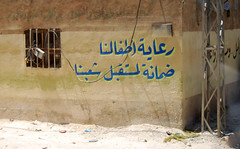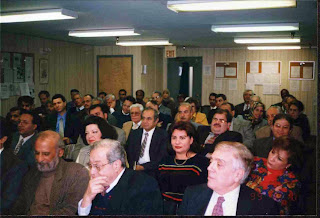 |
 by Alessandra Kocman by Alessandra Kocman |
Then I learned that the textbook the Foreign Service Institute used to teach Arabic grammar had been written precisely the same way. Dialogs were written in English and then translated into Arabic without regard for whether Arabic speakers would ever say them. We read them, even tried to memorize them so we could use them later. But we never learned what native speakers of Arabic would say in the same situations.
Our reading textbook was written in the early 1960s and consisted of articles highlighting the 15th session of the United Nations reporting the news of the Belgian Congo's breakaway region of Katanga among other obscure historical references. Most of the students weren't even alive in 1960.
Our reading textbook was written in the early 1960s and consisted of articles highlighting the 15th session of the United Nations reporting the news of the Belgian Congo's breakaway region of Katanga among other obscure historical references. Most of the students weren't even alive in 1960.
In addition, I wasn't happy that our classes swapped teachers every 7 or 8 weeks. We had one teacher for six hours a day, and then 7 or 8 weeks later, we would get a new teacher. There was little continuity from one teacher to another. And one of the teachers, while a native speaker of Arabic, was not at all talented as a teacher. She was unable to complete a sentence in the language she began in. If she started out in Arabic, she would end in English and vice versa. I spent the seven weeks in her class determined not to forget what I had learned. I gave up trying to learn from her.
One day a week, we spent the morning in area studies which involved presentations by think tank staff, journalists, artists, musicians, economists, history and international relations experts, and an occasional diplomat from one of the embassies in Washington who provided the historical, political, and cultural context for us. It was area studies I would have missed had I not come back to Washington.
Toward the latter half of the 40 weeks of Arabic training, we divided up into different groups for a week of offsite immersion. Two went with one of the teachers to Jordan. Most went to the Outer Banks of North Carolina where they stayed in a large house and cooked Arabic food and watched Arabic movies in addition to continuing their classroom studies. One group stayed in Washington and developed their own program involving meetings with journalists from Egypt, Lebanon, Jordan, Al Jazeerah and local journalists and reporters who covered middle eastern issues. I went with two other students, a teacher from the Foreign Service Institute from Yemen as well as another Yemeni American to Deerborn, Michigan, an area with a high proportion of the population from Arab countries, drawn to the area by the manufacturing jobs in the automobile industry.
By the time we traveled to Deerborn, Mackawee and Huda had traveled to the U.S. on Mackawee's Special Immigrant Visa and both had gotten jobs in Deerborn with ACCESS, the Arab Community Center for Economic & Social Services, one of the stops on our agenda for the immersion. It was wonderful for me to be able to see them again. That they were working in an organization that was such an important part of our offsite was just an added benefit.
 |
| Modern Yemen, 1918- 1966, by Manfred W. Wenner |
A special moment during that trip was when we went to a Yemeni restaurant in Deerborn for breakfast and brought Huda with us. Later Huda told me it was the first time she had ever gone to a Yemeni restaurant. In both Abu Dhabi and Deerborn, Mackawee would go to the restaurants and pick up food to bring home for her because only men entered those restaurants. She had gone with him to many restaurants, but never Yemeni restaurants.
When we met with people in Deerborn, there was always some tension between the goals of communicating a message to us and exposing us to Arabic spoken by native speakers. Some of the people we met with really wanted to tell us about their programs in English so that we would understand everything. But we wanted to hear the Arabic, even if it meant that we missed some of the points. In the end, we got a little of each. My recommendation to the group who traveled to Deerborn the next year was that they get the briefings about the programs in English from the instructor ahead of the trip so that they could concentrate on hearing about them in Arabic. An advantage would be that intelligent questions could be prepared ahead of time.
 |
| Al-Hewar audience |
I attended al-Hewar meetings for the remainder of the time I was getting ready to travel to Yemen. While I never understood the sessions well enough to be able to ask an intelligent question, I used the opportunity to look up the Arabic translations of words and phrases I expected might be included in the presentations ahead of time, the topics for which were announced in advance, to improve the likelihood that I would understand. I am convinced that the experience of hearing native Arabic speakers holding conversations gave me an advantage when the time came for my final exam -- the only time that I heard the instructors speaking Arabic naturally. When I returned from Yemen, I continued to attend al-Hewar meetings.
Another organization the Washington group met with and therefore introduced me to was the Arab-American Anti-Discrimination Committee or ADC. I attended their annual convention that year and learned a great deal about the challenges Arab Americans - both Christian and Muslim - had experienced over the years. The organization was founded in 1980 by Senator James Abourezk of South Dakota in some part as a reaction against the FBI's Abscam project which involved entrapping politicians accepting bribes, purportedly from Arab businessmen.
I continued to attend ADC meetings and their annual conventions after I returned from Yemen.
Did I learn Arabic well enough to do my job in Sanaa? Probably not. Did I regret spending ten months in the Arabic language program before going to Yemen? Absolutely not.
No comments:
Post a Comment